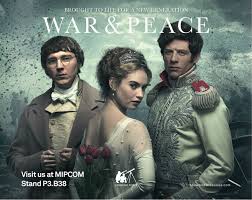WAR AND PEACE Review of BBC Production 2016
I suppose that 44 years represents a substantial enough period
between television adaptations of Tolstoy’s literary masterpiece. These
adaptations, which it has now become critically de-rigueur to giggle at, is
what the BBC does
best. [1] However, Jack Pullman’s 1972 adaptation set
the bar extremely high, and even after 44 years, it is still available on DVD,
casts a very long shadow. Given its length War & Peace lends itself far
better to TV adaptation than to film, with the action comfortably moulded into
six to nine episodes. Attempts to bring it to the big screen have been abysmal.
At this point, as parliamentarians are obliged to point out,
I must declare an interest. I read War and Peace when I was sixteen, and read
it whilst watching The Pullman adaptation, thus for me Alan Dobie will always
be Andrey Nikolayevich Bolkonsky, Morag Hood, Natasha Rostova and Anthony
Hopkins Pierre Bezhuhov. Reading the book was one of the great literary moments
of my life. So I come to the new production with a good deal of accumulated preconceptions.
In short, I expected to hate it. The pre publicity which, literally, sought to
‘sex up’ Tolstoy’s masterpiece hardly helped. However, I did not hate it and it
was a good hours TV. Though whether it is War & Peace as I have loved and
understood it is another matter.
For
any adaptation to work there are three characters that you have to get right,
they are Pierre, Natasha and Prince Andrey. Unfortunately in this production
only Prince Andrey comes close to an effective screen rendition of one of
Tolstoy’s primary characters. Paul Dano as Pierre captures the clumsiness and
socially ineptitude of the young man but
he is presented as boyish and lightweight. This is to misunderstand Tolstoy’s
character who whilst socially inadequate is intellectually vibrant and contains
a core of real substance, it is surely this that fuels Andrey’s friendship with
him. The dour and aloof Andrey would have nothing to do with the boyish character
presented here. Surely
Pullman’s technique of allowing the audience to hear Pierre’s inner voice is
the best way to convey the depth of the character.
Natasha on the other hand is too old, too fully developed.
In the novel she is introduced as a sprightly girl of thirteen, little more
than a child. Her vivacity is rooted in sexual ignorance. Thus we wobble
unsteadily into a drama already over scented with sexuality, - the incestuous
relationship between Helena and her brother Anatole, so gently hinted at in the
book that I could not remember it, is here made explicit.
There has been some effective, even inspired, casting with
Rebecca Front’s Anna Mikhailovna, and Adrian Edmondson’s papa Rostova truly
excellent. However, Jim Broadbent is a little too gentle as the rasping and
irascible old Prince Bolkonsky, Broadbent ‘s Prince hardly likely to inspire
the terror that the Old Prince generates in the book.
All this said, for I am indeed spoilt having seen what for
me will always be the original, the drama here bears just enough resemblance to
Tolstoy’s masterpiece to provide substantial and engrossing entertainment. My
advice however will always be to read the book.
[1]This is what I call 'click-bait'
criticism. Thus '... this compellingly silly Russian saga is just a bit too
English." Yeah one of the masterpieces of world literature reduced
to the click bait of ‘compellingly silly
Russian saga. Step forward Stuart Jeffries and the Guardian.
As for it 'being too English' well presumably the BBC
could have hired an all-Russian cast, delivering the dialogue in Russian and of
course French in which much of the conversation occurs in the book, but I
suspect audience numbers might come down a little.





